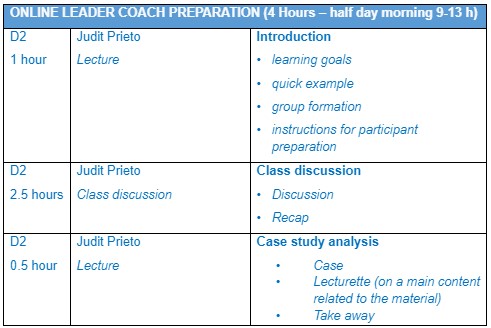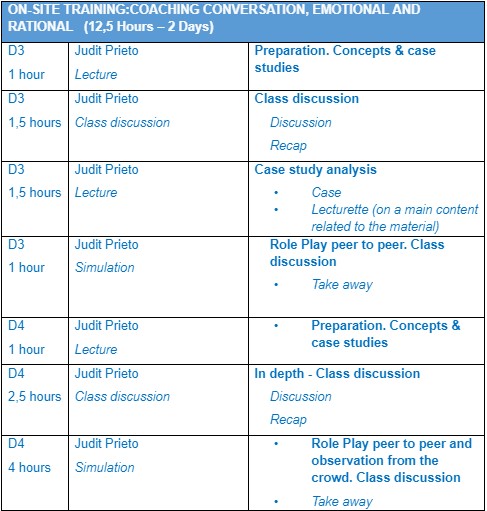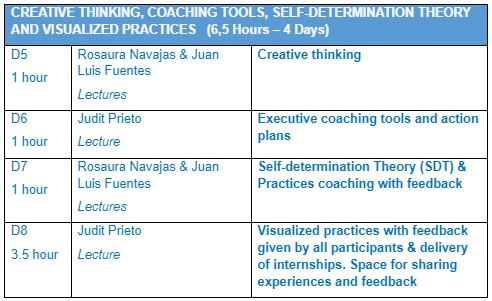Coaching development program

Date:
- – Online lectures (14,5 h) 29.10.–22.11.2024
– Onsite training or Online training(12,5h) 14.11-15.11.2024. - If you prefer the onsite training this will take place at the Complutense University, Madrid, Spain.
Learning model: An inductive learning system, eminently practical and experiential, based on rigor, a sense of humour, and neuroscience applied to the development of talent to grow in resilience, which will combine theory and practice in a participative and fun way, thus promoting an enriching and lasting space for co-creation for the participants in the program. This programme will be delivered by professional coaches, with extensive experience in accompanying people to develop their potential. A methodology is used to document the interviews and calibrate each session.
In this course, you will learn the methodology to apply it efficiently with work teams and their members individually. You will learn to manage the emotional part of the conversation in order to strengthen interpersonal relationships by practicing the necessary resources to establish empathy, promote trust and listen in depth to the interlocutor. You will learn the methodology to design meaningful and achievable research and work objectives. Overcome challenges with resilience and motivation.
Construct powerful questions that promote creative thinking and innovation. Practice coaching resources to draw up efficient action plans. Learning the coaching methodology to design meaningful and achievable research and work objectives.
Target Audience
The short course is aimed at managers, operators and other professionals in Research Infrastructures or Core Facilities.
Learning outcomes
From this course you will take away solutions to apply in your team and in your own RI or CF manager development as a leader coach. Become a leader coach and learn the GROW model as you use it for yourself.
After completing this programme, participants will be trained in these skills
- Effective communication that involves conveying messages clearly, actively listening to others, and adapting to different communication styles and contexts to ensure mutual understanding.
- Pay attention to and understanding the speaker’s message through verbal and nonverbal cues, focus on the speaker, avoid interrupting or formulating a response prematurely, and confirm understanding by paraphrasing or summarizing what the speaker has said
- Manage the emotional and rational part of the conversation in order to strengthen interpersonal relationships by practicing the necessary resources to establish empathy, promote trust and listen in depth to the interlocutor.
- Promote motivation as the driving force that compels individuals to take action towards achieving their goals
- Learn how to to inspire and energize their teams, to set clear goals and expectations, and to create an environment that encourages creativity and innovation
- Understand how to lead by example, setting high standards for themselves and their teams and working tirelessly towards achieving their objectives
- Gain in resilience as the ability to stay focused and positive in the face of challenges, to maintain a sense of perspective, and to lead their teams through difficult times
- Be able to recognize and manage stress, remain flexible and adaptable, and stay motivated and productive in the face of obstacles.
The module is designed to provide the Learners with:
Establish your own coaching practice and toolss
Skills to coach individuals for better performance
Transform teams through coaching
Set unambiguous expectations and accountability
Evaluate performance
Lead productive conversations
The Programme – ed. 2024
Team development (4 hours, 0.5 days, October 29, 2024)
| OBJECTIVES YOU HOPE TO ACHIEVE (4 Hours – 1st day) | ||
| D1 1 hour | Judit Prieto Mayte Tortosa Lecture | •Program presentation, objectives, methodology, and development. Introduction: presentation of the learning goals, quick example, group formation and instructions for participant preparationPreparation.Concepts & Case studies |
| D1 1 hour | Judit Prieto Class discussion (I part) | Class discussion (I part) CaseRecap |
| D1 1 hour | Judit Prieto Preparation.Concepts & Case studies | Regarding the objectives you hope to achieve (self analysis) What does it mean? With everything you’ve wrote, what would your goal really be? When do you want to get it? What deadlines do you want for this? How will you know that you have achieved your goal? What are the nearest and farthest goals in time? Does the objective of this chapter bring you closer to your ultimate goal? In what sense? What do you want to achieve in the next chapter? |
| D1 1 hour | Judit Prieto Class discussion (II part) | Case study analysis CaseLecturette (on a main content related to the material)Take away |
Online leader coach preparation (4 hours, 0.5 day, November 5, 2024)
| ONLINE LEADER COACH PREPARATION (4 Hours – half day) | ||
| D2 1 hour | Judit Prieto Lecture | Introduction learning goalsquick examplegroup formationinstructions for participant preparation |
| D2 2.5 hours | Judit Prieto Class discussion | Class discussion DiscussionRecap |
| D2 0.5 hour | Judit Prieto Lecture | Case study analysis CaseLecturette (on a main content related to the material)Take away |
On-site training: coaching conversation, emotional and rational (12.5 hours, 2 days, November 14 and 15 2024)
| ON-SITE TRAINING:COACHING CONVERSATION, EMOTIONAL AND RATIONAL (12,5 Hours – 2 Days) | ||
| D3 1 hour | Judit Prieto Lecture | Preparation. Concepts & case studies |
| D3 2,5 hours | Judit Prieto Class discussion | Class discussion DiscussionRecap |
| D3 0,5 hour | Judit Prieto Lecture | Case study analysis CaseLecturette (on a main content related to the material)Take away |
| D3 1. hour | Judit Prieto Lecture | Preparation. Concepts & case studies |
| D4 3hours | Judit Prieto Simulation | Role Play peer to peer. Class discussion |
| D4 0,5 hour | Judit Prieto Lecture | Case study analysis CaseLecturette (on a main content related to the material)Take aways |
| D4 3,5 hours | Judit Prieto Class discussion | In depth – Class discussion DiscussionRecap |
| D4 0,5 hour | Judit Prieto Lecture | Final recap CaseLecturette (on a main content related to the material)Take away |
Creative thinking, executive coaching tools and action plans, Self-determination Theory (6.5 hours, 4 days, November 19, 20, 21 and 22, 2024)
| CREATIVE THINKING, COACHING TOOLS,SELF-DETERMINATION THEORY AND VISUALIZED PRACTICES (4,5 Hours – 4 Days) | ||
| D5 1 hour | Juan Luis Fuentes Lecture | Creative thinking |
| D6 1 hour | Judit Prieto Lecture | Executive coaching tools and action plans |
| D7 1 hour | Juan Luis Fuentes Lecture | Self-determination Theory (SDT) |
| D8 1,5. hour | Judit Prieto Lecture | Visualized practices with feedback given by all participants & delivery of internships. Space for sharing experiences and feedback |
The Programme – ed. 2023
| INTRODUCTION – 01/06/2023 ONLINE – FROM 09:00-13:00 |
| Program presentation, objectives, methodology, and development. What they will have achieved by the end of the course. Contextualisation: Revolution 4.0 What´s coaching and What´s not? How coaching is appliedRecommended Readings prior to presential training Opening. Module I at the e-learning platform ( reading, videos, didactic material, etc). |

| SESSIONS 1 – 9/06/2023 ON-LINE – 09:00-13:00 |
| Basic notions of how the brain and the mind work and how to enhance them to develop one’s own and others’ talents Biases and their influence on the way we perceive reality, and consequences. Tools for self-improvement. Practices A healthy ego, development. Difficulties and challenges (Practical) Coach leader competencies: knowing, knowing how to do, and knowing how to be Values of the coach leader Mission and personal life project of the coach leader Ethics in the performance of coaching at work. Exemplarity of the leader. Introduction to creative thinking Verbal and non-verbal communication |

| SESSIONS 2 AND 3 – 15/06/2023 13:30- 18:30 | 16/06/2023 09:00-12:30 – 13:30-17:30 |
| Cognitive and Emotional Brain and Stress Management Self-motivation, Joy, and Self-esteem Confidence building Deep and empathic listening Resilience Meta-learning and feedback How to focus a coaching conversation: issue, reality, objective, powerful questions, and action plan |

| 22/06/2023 | 23/06/2023 | 29/06/2023 | 30/6/2023 |
| After sessions 2 and 3 are finished, there will be several classes of concept deepening and practice to integrate all that has been practised in the in-site modules, where experiences, doubts, etc. will be shared |

The Faculty – ed. 2024
| Name | Short bio |
|---|---|
| Mayte Tortosa | Expert in professional and executive, team coaching to help people grow up, embrace the change, reskilling and upskilling. Training and development of talent at corporates, middle companies and start-up ecosystem and entrepreneurs, lecturer and podcaster (Grow up talent).CEO & Founder of YUGROW ( Yucoach Services, S.L.). Master in executive, professional and team coaching by UAM. Master in Human Resources, Compensation & Benefits espec. by Escuela de Negocios Garrigues. Graduated in Law by UAM. |
| Judit Prieto | Expert in personal and professional coaching, as well as team and systemic leadership. Emotional Intelligence and Educational Coaching. Socialeducator. Master Degree Audiovisual Communication, Bachelor Degree in Social Education, Expert in personal, executive and systemic and team coaching by EFIC and Crearte. (ICF). Diploma in Drama by City Literature Institute of London. |
| Juan Luis Fuentes | Associate Professor at the Department of Educational Studies, Faculty of Education – Teacher Training Centre, Complutense University of Madrid (UCM). Dean´s Delegate for Communitarian Relations, Participation, and Cooperation; and Academic Coordinator of Advanced Studies in Social Education Master Degree. Manager and member of the Research Group “Civic Culture and Educational Policies”. He has also been Visiting Scholar at Eastern Washington University (USA), Roehampton University (United Kingdom), Freie Universität (Germany) and University of Birmingham (United Kingdom). He has a Degree in Pedagogy, a Degree in Social Education, and a PhD in Education from UCM. |
| Javier Cuervo | Learning Advisor, LEINN degree lecturer and trainer, LEINN Mentor & Digital Economy lecturer, e-commerce expert, digital marketing expert, BigData, Analytics and Artificial Intelligence expert. Chemical Degree in Organic Chemistry. Master of Management, Marketing and support Services Business of IESE Business School- University of Navarra Executive MBA Business Administration and Management at Escuela de Organización Industrial. |
The Faculty – ed. 2023
| Name | Short Bio |
| JUAN LUIS FUENTES | Associate Professor at the Department of Educational Studies, Faculty of Education – Teacher Training Centre, Complutense University of Madrid (UCM). Dean´s Delegate for Communitarian Relations, Participation, and Cooperation; and Academic Coordinator of Advanced Studies in Social Education Master Degree. Manager and member of the Research Group “Civic Culture and Educational Policies”. He has also been Visiting Scholar at Eastern Washington University (USA), Roehampton University (United Kingdom), Freie Universität (Germany) and University of Birmingham (United Kingdom). He has a Degree in Pedagogy, a Degree in Social Education, and a PhD in Education from UCM. |
| MAYTE TORTOSA | Expert in professional and executive, team coaching to help people grow up, embrace the change, reskilling and upskilling. Training and development of talent at corporates, middle companies and start up ecosystem and entrepreneurs, lecturer and podcaster (Grow up talent).CEO & Founder of YUGROW ( Yucoach Services, S.L.). Master in executive, professional and team coaching by UAM. Master in Human Resources, Compensation & Benefits espec. by Escuela de Negocios Garrigues. Graduated in Law by UAM. |
| ROSAURA NAVAJAS | Specialist in Coaching and Emotional Education for Educational ExcellenceDiploma in General Basic Education Teaching.Doctorate by UCM. Coaching methodology in teacher training for competence development and professional enhancement. |
| JUDIT PRIETO MONTERO | Expert in personal and professional coaching, as well as team and systemic leadership. Emotional Intelligence and Educational Coaching. Social educator.Master Degree Audiovisual Communication, Bachelor Degree in Social Education, Expert in personal, executive and systemic and team coaching by EFIC and Crearte. (ICF). Diploma in Drama by City Literature Institute of London. |
| JAVIER CUERVO LÓPEZ | Learning Advisor, LEINN degree lecturer and trainer, LEINN Mentor & Digital Economy lecturer, e-commerce expert, digital marketing expert, Big Data, Analytics and Artificial Intelligence expert.Chemical Degree in Organic Chemistry. Master of Management, Marketing and support Services Business of IESE Business School- University of Navarra Executive MBA Business Administration and Management at Escuela de Organizacion Industrial. |
How to apply

All CPD courses will be formally delivered by the University of Milano-Bicocca. As such, you will be part of the academic community. According to Italian academic law, there are some compulsory tasks that must be performed:
1- The application period is from July 31, 2024, to September 9, 2024.
2- To provide the Faculty with a comprehensive view of all candidates, you must browse the course catalog and submit all required information through a specific form for each course you wish to participate in. This step is mandatory to enter the selection process, but it does not guarantee admission (please refer to point 4).
3- The Faculty will select the appropriate candidates for the courses between September 10, 2024, and September 16, 2024.
4- All selected candidates are required to formally enroll on the ESSE3 platform here: https://s3w.si.unimib.it/Root.do. If a candidate does not complete the process on the ESSE3 portal, they cannot be admitted to the courses. The profiling process must be completed through this platform and cannot be handled by the administrative office, as it is a formal requirement for admission. All registrations must be completed by October 3rd. No grace period has been planned.
Apply by filling in the form and upload your CV (max 3 pages)
Cost
The pilot short course is offered free-of-charge and requires the participant’s full commitment during lectures, group work and written assignments.
Info & Contact

Practical info – ed. 2024
Coming soon.
Practical info – ed. 2023
Classroom
Hiperaula 1, Education Faculty, building 2, Calle Rector Royo Villanova 1, Universidad Complutense de Madrid
The Faculty of Education is located in the Moncloa Campus, in the northeast sector, between the streets Rector Royo Villanova and Avenida de las Moreras. The center can be accessed from both streets, although the main entrance is located at:
c/ Rector Royo Villanova, 1. 28040 Madrid.
The Faculty of Education can be reached by Metro or bus. The nearest Metro station is Vicente Aleixandre (line 6), exit to Juan XXIII, but it is also very close to Francos Rodríguez station (line 7), exit to Pablo Iglesias by the elevator.
The nearest bus lines are: Circular, 45 and 132.
Accomodation
More info here: https://www.ucm.es/english/housing-office
FAQs
Why should I take this programme?
The programme is aimed at managers, operators and other professionals at Research Infrastructures and Core Facilities willing to share their experience and upskill themselves.
Who is behind this programme?
The pilot programme is designed by academic and educational experts who gathered in the RItrainPlus project to share their long experience working or leading Research Infrastructures or other scientific institutions.
How is the programme organized?
The programme is divided into seven short courses, each containing separate sessions. The short courses take up 16–32 hours each for the training sessions, plus individual work.
How do I take part?
The participants can take up either the whole programme and progress from one short course to the next, or take an individual short course that best fits their needs. For those interested in taking up the whole programme, it should be noted that although the session activities will not be overlapping, time for individual work might be hardly enough. Participants are advised to check the course schedules for more information.
Once selected to be part of the program, the University of Milano-Bicocca will provide you with an official account to log into the e-learning platform. Through this email account, you will receive all official communications from the University and the final Certificate of Completion.
What’s expected of me?
The Pilot courses are part of a development project which will be enriched by the Participants. Strong commitment to this concept is necessary. The participant is expected to participate in at least 75% of the scheduled activities. Participation in the programmed in-person activities is mandatory. The individual courses are assessed in different ways.
Do I have to take all the sessions in a short course? Can I just choose what I like?
The participant needs to participate in all the sessions in the short course. Course’s thematic units are not opt-in modules.
What does it cost?
The pilot courses are offered free of charge for the Participants. The Project is supported by the European Union’s H2020 programme under grant agreement no.101008503
How are the courses taught?
The short courses are offered mostly as online courses that take up to 6 typically non-consecutive half-days. The courses are taught by experienced Academics and Executives at RItrainPlus partner universities and institutions with the contribution of invited international Experts. The courses will be delivered in the period October-November 2024.
How do I apply? Is there a selection process? Are there specific administrative tasks to complete in order to be formally enrolled?
All CPD courses will be formally delivered by the University of Milano-Bicocca. As such, you will be part of the academic community. According to Italian academic law, there are some compulsory tasks that must be performed:
1- The application period is from July 31, 2024, to September 9, 2024.
2- To provide the Faculty with a comprehensive view of all candidates, you must browse the course catalog and submit all required information through a specific form for each course you wish to participate in. This step is mandatory to enter the selection process, but it does not guarantee admission (please refer to point 4).
3- The selection of accepted candidates will be performed until September 17th, 2024.
4- All selected candidates are required to formally enroll on the ESSE3 platform here: https://s3w.si.unimib.it/Root.do. If a candidate does not complete the process on the ESSE3 portal, they cannot be admitted to the courses. The profiling process must be completed through this platform and cannot be handled by the administrative office, as it is a formal requirement for admission. All registrations must be completed by October 3rd. No grace period has been planned.
When will I know if my application has been accepted?
Selected participants are informed of the acceptance of their application by September 17th 2024.
What if I realize that I cannot participate anymore after I’ve been admitted to participation?
If the participant wishes to cancel their participation, they are required to inform the organizers at least two weeks prior to the starting of the course
